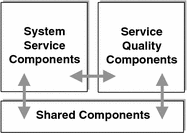Java Enterprise System Components
Java Enterprise System is an integration of discrete software products and components into a single software system. The components of this system have been tested together to ensure interoperability. Their integration is facilitated by a number of system-level features:
-
All components are synchronized on a common set of shared libraries.
-
All Java ES components are installed using a single installer.
-
All Java ES components can share an integrated user identity and security management system.
These features are described in subsequent chapters of this book. The focus of this section is to introduce the various components that are integrated into Java Enterprise System. These system components can be grouped into three main categories, as shown in the following illustration:
-
System service components. These components provide the main Java Enterprise System infrastructure services that support distributed enterprise applications.
-
Service quality components. These components enhance the availability, security, scalability, serviceability and other components of system service components and distributed application components.
-
Shared components. These components provide the environment in which many system service components and service quality components run.
Figure 1–2 Categories of Java ES Components

System Service Components
A number of Java ES components provide the main services that support distributed software solutions. These system services include portal services, communication and collaboration services, identity and security services, web container services, and J2EE application services.
The system service components that provide these distributed services, and the services they provide are briefly described in the following table. Each system service component is a multi-threaded server process capable of supporting a large number of clients. For more details on any component, see System Service Component Descriptions
Table 1–1 Java ES System Service Components
Service Quality Components
In addition to the system service components shown in Table 1–1, Java Enterprise System includes a number of components used to enhance the quality of services provided by system service components. Service quality components can also enhance custom-developed application services. The service quality components fall into the following categories:
-
Availability components
-
Access components
-
Administrative components
Availability Components
Availability components provide near-continuous uptime for system service components and custom application services. The availability components included in Java Enterprise System and the services that they provide are shown in the following table. For more details on any component, see Availability Component Descriptions.
Table 1–2 Java ES Availability Components|
Component |
Availability Services Provided |
|---|---|
|
Provides high availability and scalability services for Java Enterprise System, the applications that run on top of the Java Enterprise System infrastructure, and the hardware environment in which both are deployed. |
|
|
Provides a data store that makes application data, especially session state data, available even in the case of failure. |
Access Components
Access components provide front-end access to system services, often secure access from Internet locations outside an enterprise firewall. In addition to providing such access, many provide a routing function as well. The access components included in Java Enterprise System and the services that they provide are shown in the following table. For more details on any component, see Access Component Descriptions.
Table 1–3 Java ES Access Components|
Component |
Access Services Provided |
|---|---|
|
Provides security services for Directory Server from outside a corporate firewall. Directory Proxy Server provides directory access control,and routing for multiple Directory Server instances. |
|
|
Sun Java System Web Proxy Server |
Provides for caching, filtering, and distribution of web content for both outgoing and incoming internet requests. |
|
Sun Java System Communications Express |
Provides web-based access to Messaging Server, Calendar Server, and Directory Server, depending on configuration. |
|
Provides secure, Internet access from outside a corporate firewall to Portal Server content and services, including internal portals. |
|
|
|
|
|
Provides desktop clients using Microsoft Outlook with an interface to both Messaging Server and Calendar Server. |
Administrative Components
Administrative components provide management functions, such as configuration and monitoring, for system services. The administrative components included in Java Enterprise System and the services that they provide are shown in the following table. For more details on any component, see Administrative Component Descriptions.
Table 1–4 Java ES Administrative Components|
Component |
Administrative Services Provided |
|---|---|
|
Provides a graphical administration tool that lets you configure and manage Directory Server and Messaging Server. |
|
|
Provides a script for configuring Directory Server with the schema needed to provision users for Messaging Server and Calendar Server. |
|
|
Provides both command-line and GUI tools for populating user entries in Directory Server with user attributes needed by Messaging Server and Calendar Server. |
Shared Components
Java Enterprise System includes a number of locally installed shared libraries upon which many system service components and service quality components depend. Java ESshared components provide local services to Java ES components running on the same host computer.
Shared components are often used to provide portability across different operating systems. Examples of Java Enterprise System shared components include: Java 2 Platform, Standard Edition (J2SETM platform), Netscape Portable Runtime (NSPR), Network Security Services (NSS), Network Security Services for Java (JSS), and so forth. For a complete list, see Shared Components.
Shared components are installed automatically by the Java ES installer depending on the system service and service quality components that are being installed.
- © 2010, Oracle Corporation and/or its affiliates
